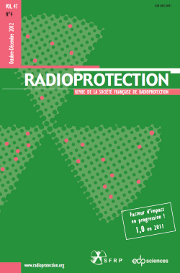Article contents
Protection of the environment from ionising radiation in a regulatory context (PROTECT): Assessment approaches – practicality, relevance and merits
Published online by Cambridge University Press: 06 June 2009
Abstract
In common with the assessment of chemical stressors many of the methods used for the assessment of risk of non-human biota exposed to radiation use tiered approaches. The initial tier within these approaches is designed to be simple and conservative with the aim to identify sites of negligible concern which can be excluded from more detailed assessment with a high degree of confidence. In this paper we compare the outputs of the screening tiers of three tools which are freely available as software packages. Outputs were compared for terrestrial and freshwater ecosystems assuming 1 Bq per unit media. Considerable variability between the risk quotients (RQ) estimated by the three approaches used was seen for some radionuclide-organism-ecosystem combinations. Reasons for this are explored with differences in transfer parameters used by the models being a common contributor. The large variation within RQ values estimated by the approaches requires further investigation as it does not promote the level of confidence required by the user. The practicalities of applying a single generic screening dose rate in assessments are also explored.
Information
- Type
- Research Article
- Information
- Radioprotection , Volume 44 , Issue 5: ECORAD 2008 - Radioecology and Environmental Radioactivity , 2009 , pp. 623 - 628
- Copyright
- © EDP Sciences, 2009
References
- 4
- Cited by

